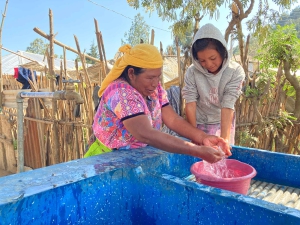ACTIVE PROGRAMMES in 2021
In addition, three other programmes are being implemented:
GTM-015-B, Project RU K´UX YA (“Water Heart”), an initiative that aims to contribute to health and the reduction of incidences of diarrhoeal diseases in 12 municipalities in the province of Sololá, by improving management and sustainable access to water and sanitation. It is expected to be completed in 2023 and has a budget of 7.5 million euros, 6 million of which have been donated by the FCAS. It is worth highlighting some of the actions carried out under this programme, such as the implementation of 30 conservation plans for Water Recharge Zones; the certification of 22 communities as “FIDAL zones” (End to Open-Air Defecation); training courses for municipal technicians and local authorities, and the fact that 12 municipalities now have a specific unit for the management of water and sanitation (Municipal Water and Sanitation Office).
The programme titled Technical Bases for the Establishment of a Water Safety Strategy for the Metropolitan Area of Guatemala City and Municipalities of the Greater South City Community of Municipalities (GTM-016-B) is also underway, with a cash grant of 656,000 euros, of which the International Union for the Conservation of Nature is the beneficiary and executor, and a part of the grant in kind – valued at 2.2 million euros – of which the municipality of Guatemala City is the beneficiary. The objective is to promote a water safety strategy for the reliable provision of water to the populations of the Guatemala City valley. To this end, the programme is studying the state and degree of exploitation of the aquifer and other sources of resources from which the populations of the Guatemala City valley are supplied and analysing other possible resource alternatives.
Within this programme, a specific initiative has been launched, the Water Safety Programme of the Metropolitan Region of Guatemala (PROSEHIGUA), which launched a campaign in March 2021, with support from the Fund, to value the importance of water for humanity and ecosystems.
Also in the province of Sololá, the Institutional and technical strengthening programme for the provision of water and sanitation services to improve resilience in communities in the municipality of Sololá (GTM-017-B), is in the design phase. It has a budget of 875,000 euros and will begin to be implemented by Acción Contra el Hambre Guatemala in January 2022. A programme designed to alleviate the consequences of the health crisis caused by COVID-19 and that stresses the strategic line of the FCAS, which is committed to strengthening partner organisations and improving global water governance.
On the other hand, within the multilateral portfolio managed together with the IADB, the Drinking Water and Sanitation Programme for Human Development, phase I (GTM-001-M) is being carried out in conjunction with the Municipal Development Institute (INFOM) and has a total budget of 68 million euros, of which 34 million euros are a direct donation from the Water Fund. This programme has focused on vulnerable rural areas to guarantee water and sanitation services and has strengthened INFOM, municipalities and water boards. In addition, technical cooperation resources have been used to design a sanitation strategy for the Greater Southern Commonwealth. The programme also promoted the creation of the Directorate of Drinking Water and Sanitation (lead agency) and developed an intervention strategy and a procurement plan to strengthen water quality control. Among the actions carried out, it is worth mentioning the design of 43 systems in rural localities and 17 in small towns, as well as the construction of 53 drinking water systems and 74 sanitation solutions in rural localities. It has also enabled the training of 59,031 people in health and environmental education. So far, the programme has benefited 70,600 people out of the 130,000 expected to benefit by the end of its implementation in October 2022
COUNTRY CONTEXT

One of the greatest difficulties in Guatemala is that there is no specific legislation to regulate the use and development of water, in addition to institutional weakness, which does not facilitate the fulfilment of obligations related to human rights to water and sanitation.
The institutions in charge of water management are mainly the municipalities and, in rural areas, the communities themselves, which usually do not have sufficient capacity and resources to adequately manage and plan the provision of drinking water and sanitation services.

